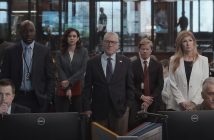Ben Wheatley’s career to date has been fascinating, quickly establishing him as a singular auteur with strong work like Kill List and A Field in England. For his latest he directs Amy Jump’s adaptation of JG Ballard’s 1975 novel High Rise, often dubbed unfilmable. In the film, a young surgeon, Laing (Tom Hiddleston) moves into one of five new tower blocks built by visionary architect Anthony Royal (Jeremy Irons) and is drawn into the debauched lifestyle, social hierarchy and power struggles that dominate the building as one moves up the floors. When Wheatley was promoting the film at last year’s London Film Festival, he was quoted as saying “societal collapse was imminent,” and that Ballard was right about the “dystopian nightmares” he predicted. One hopes not, but here at least society collapses rather entertainingly.
Laing gets to know his fellow tenants: burly, moody Wilder (Luke Evans), hoping to document the building’s slide into anarchy; his pregnant wife, Helen (Elisabeth Moss), trying to stay safe and sane; seductive Charlotte (Sienna Miller), admiring Laing from her balcony upstairs; Royal and his wife (Keeley Hawes) staying detached in the penthouse, guarded by nasty Simmons (Dan Renton Skinner). Wheatley brings back Reece Shearsmith and Peter Ferdinando from A Field in England to round out a talented cast that delivers a rich, confusing and disturbing slide into anarchy as class warfare ultimately divides the building into violent tribes.

The period set design is immaculate, giving the environment a detached, alien quality that is at the same time undeniably 70s. Few directors working today deliver a sense of, as Patrick Bateman would say, nameless dread the way Wheatley does; his lingering, sumptuously shot chaos delivers in the way something like Only God Forgives failed to do, driven as it is by strong performances and at least some sense of narrative. The film peaks with a montage of that societal collapse set to a beautifully bleak Portishead cover of ABBA’s ‘SOS’, as the violence and transgression builds to a crescendo – again, not a surprise if you’re a fan of Wheatley’s work, but unlikely to win him any new fans who are of a sensitive disposition. Clint Mansell’s score is tremendous throughout, a claustrophobic and pulsating accompaniment that drives the action forward.
It does slump a little in the third act – the film opens by showing us the ending, so once the descent into madness plays out, it’s not entirely clear what we’re waiting for. Hiddleston is wonderfully cast, betraying just enough emotion to keep us invested, but at the same time unhinged enough to slip seamlessly into the chaos of the tower block. Perhaps the only serious misstep the film makes is an oddly clunky Thatcher jibe at the end; the source novel was published in 1975 before she ever came to power and the capitalist critique is pretty obvious throughout. It seems decidedly un-Wheatley-like to spell it out so bluntly. But all in all the film delivers bleak, anarchic, violent societal collapse with a degree of panache. We look forward to Wheatley’s next film, Free Fire, a 70s Boston-set crime drama starring Sharlto Copley (District 9) and Brie Larson (Room).




